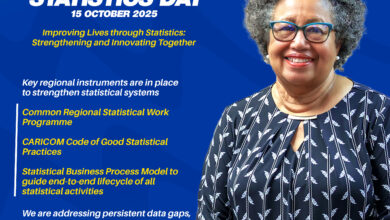Honourable Ministers
Other Distinguished Delegates
Staff of the CARICOM Secretariat
Members of the Media
Ladies and Gentlemen
It is with special pleasure that I welcome you to this Seventeenth Meeting of the Council for Trade and Economic Development (COTED). The welcome is particularly warm for the number of new Ministers who are with us for the very first time. I gather that this applies to the Chairman himself – the distinguished Minister of St. Vincent and the Grenadines. I am aware that this applies too, to the distinguished Minister of Antigua and Barbuda; and my information is that it also applies to the Minister of Dominica. And the Minister from Saint Lucia – even though he may have been here before – this is his first meeting of COTED. And finally, perhaps most importantly, the distinguished Minister of Trinidad and Tobago, the Hon. Jarrette Narine.
I want to say a very special welcome to these new Ministers, who have come to reinforce the Council For Trade and Economic Development, and I am sure that they bring with them tremendous contributions to the work of this body.
This meeting of COTED will deal extensively, though not exclusively, with the agriculture sector, particularly in the context of the CARICOM Single Market and Economy (CSME). In welcoming you all, I wish to express my deep appreciation to the Government of Trinidad and Tobago, for agreeing to our relatively late request to host this meeting when it became clear that the customary accommodation in our Headquarters in Georgetown was not going to be available. We all therefore owe a special debt of gratitude to Minister Valley for being here.
Honourable Ministers, Distinguished Delegates, I welcome you at a time when the Region is once again focusing on the vital sector of agriculture – the guiding principles for which are entrenched in the Revised Treaty of Chaguaramas. I say once again because our history is replete with initiatives for the development of that sector, none of which has quite achieved its goal. This has, however not diminished the importance of that sector. On the contrary, recent trends and events have served to heighten its importance.
At the global level, for example, no issue has been more central and more difficult in the negotiations for a World Trade Organisation (WTO) trading regime emerging from the Doha development agenda than agriculture; and indeed none will be more decisive in the process of rekindling those negotiations. At the hemispheric level, there is no issue more stubborn of resolution in the negotiations for a Free Trade Area of the Americas (FTAA) agreement than agriculture; nor is any sector more central to our relations with the European Union, in particular, commodities such as sugar, bananas and rice.
Within CARICOM, we are all aware of the difficult task which we face in giving life and substance to the Regional Transformation Programme in Agriculture. All these difficulties derive from the realization of the multi-functional nature of this sector and of its critical importance to our way of life. Agriculture has a pivotal role to play in achieving our objectives of poverty reduction, food security and sustainable development. This is all the more so as it includes the vital sub-sector of fisheries development, in particular for our concerns, the question of a Common Fisheries Regime.
At this Seventeenth Meeting of the COTED, Honourable Ministers, in addition to the issues directly relating to agriculture, you will have before you a number of other related matters including intra-regional trade in goods, standards development, and transportation, particularly the new International Ship and Port Security Code, with its imminent July 1 implementation deadline. You will also be called upon to consider a number of critical items relating to our sustainable development, especially in the context of the ongoing international negotiations for the ten-year Review of the Barbados Programme of Action for Small Island Developing States (SIDS).
The task before you Honourable Ministers, is however not one for Governments alone. Our private sector, our specialized agricultural bodies, our development banks and other financial institutions, our farming associations, our tourism organizations for example, all have a critical contribution to make to the process of developing this multi-faceted sector.
Without the contribution of all stakeholders, and a supportive international environment, the objective of a competitive agricultural sector would be well nigh impossible to achieve. But Governments must take the lead: today Hon. Ministers, you are charged with that responsibility.
I look forward therefore, to two days of successful deliberations.





